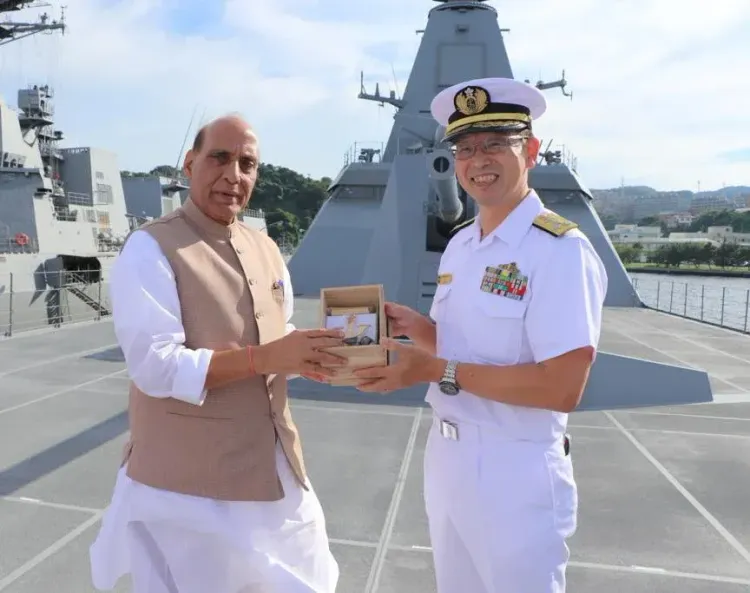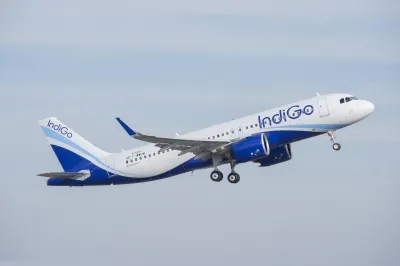Is India and Japan Creating an Unprecedented High-Technology Military Partnership?

Synopsis
Key Takeaways
- India and Japan are forming a unique military partnership.
- The collaboration goes beyond traditional arms trade.
- Japan shares advanced technology with India.
- The UNICORN project enhances naval capabilities.
- This partnership signifies a shift in Indo-Pacific security dynamics.
Tokyo, Aug 9 (NationPress) Japan and India are breaking away from decades of limitations and traditional defense alliances to establish an unprecedented high-technology military collaboration, as highlighted this week in a comprehensive report by the Tokyo-based Japan Forward Association.
According to Pema Gyalpo, a visiting professor at the Takushoku University Centre for Indo-Pacific Strategic Studies, the Indo-Pacific region is at a pivotal moment where technological superiority increasingly influences strategic results. In this context, Japan and India are overcoming historical barriers and conventional defense partnerships to create this unique military collaboration.
Gyalpo further states, This evolving relationship goes beyond typical arms trade. It signifies a fundamental rethinking of how two prominent democracies can collaboratively develop, manufacture, and deploy advanced defense systems that will influence regional security frameworks for generations to come.
The long-standing friendship between India and Japan has gained significant momentum, especially after the elevation of their relationship to a Special Strategic and Global Partnership in 2014.
Defensive exchanges between the two nations have strengthened in recent years, reflecting their shared perspectives on matters of peace, security, and stability in the Indo-Pacific region.
A Memorandum of Implementation was signed at the Embassy of India in Tokyo on November 15, 2024, for the co-development of the Unified Complex Radio Antenna (UNICORN) mast, intended for installation on ships of the Indian Navy.
The MOI was exchanged between Sibi George, the Ambassador of India to Japan, and Ishikawa Takeshi, Commissioner of the Acquisition Technology and Logistics Agency (ATLA) under Japan's Ministry of Defense, during a ceremony in Tokyo.
The UNICORN mast features integrated communication systems designed to enhance the stealth capabilities of naval platforms.
The Indian Navy is actively pursuing the introduction of these advanced systems, which will be co-developed by Bharat Electronics Limited in India in collaboration with Japanese partners.
This agreement marks the first instance of co-development of defense equipment between India and Japan.
According to the Japan Forward report, The importance of this development is significant. Japan's willingness to share its advanced stealth technology, currently utilized on its state-of-the-art Mogami-class frigates, places India as the second Asian nation, following the Philippines, to receive such sophisticated defense equipment from Tokyo. This selective technology transfer highlights the strategic trust developed between the two countries and affirms Japan's recognition of India as a vital partner in sustaining Indo-Pacific stability.
Both nations have reiterated their commitment to enhancing cooperation in the defense industry and technology sector, agreeing to improve co-production and co-development efforts in defense manufacturing.
Beyond radar systems, the potential for collaboration spans the entire range of advanced military technologies. Japan's expertise in submarine technology offers immense opportunities, particularly with the Soryu-class submarines, which feature revolutionary lithium-ion battery propulsion systems and represent the pinnacle of conventional submarine technology. These 4,200-ton vessels boast unmatched stealth and endurance capabilities, surpassing the French Scorpene submarines currently being manufactured in India and the German Type 214.
The report underlines that Japan possesses advanced technologies and precision in manufacturing, while India provides a vast market, expanding technological capabilities, and strategic depth in the Indian Ocean Region (IOR).
The Japan-India high-tech defense partnership embodies a vision of an autonomous Indo-Pacific security architecture founded on shared democratic values and mutual strategic interests. This partnership offers both nations a pathway to enhanced capabilities while maintaining strategic independence. While the UNICORN mast agreement may be just the initial step, it signifies a transformation that could redefine regional security dynamics for decades to come, according to Gyalpo.









